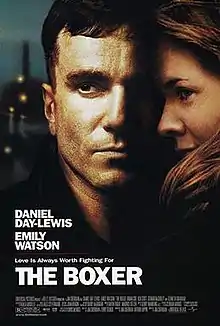| The Boxer | |
|---|---|
 Theatrical release poster | |
| Directed by | Jim Sheridan |
| Written by | Terry George Jim Sheridan |
| Produced by | Arthur Lappin Jim Sheridan |
| Starring | |
| Cinematography | Chris Menges |
| Edited by | Gerry Hambling |
| Music by | Gavin Friday Maurice Seezer |
Production companies | Universal Pictures Hell's Kitchen Films |
| Distributed by | Universal Pictures |
Release dates |
|
Running time | 114 minutes |
| Country | Ireland |
| Language | English |
| Budget | $4.7 million |
| Box office | $16.5 million |
The Boxer is a 1997 Irish sports drama film written and directed by Jim Sheridan and co-written by Terry George. Starring Daniel Day-Lewis, Emily Watson, and Brian Cox, the film centres on the life of a boxer and former Provisional IRA volunteer Danny Flynn, played by Day-Lewis, who is trying to "go straight" after his release from prison. The film is the third collaboration between Sheridan and Day-Lewis, and portrays the increase of splinter groups within the IRA.[1] In preparation for the role, Daniel Day-Lewis trained as a boxer in Ireland for a year.
Plot
Former Irish pugilist and Provisional IRA member Danny Flynn returns home to Belfast from a 14-year stint in prison at the age of 32. Weary of the unbroken cycle of violence in Northern Ireland, he attempts to settle down and live in peace. After meeting his drink-sodden old trainer Ike, Danny starts up a non-sectarian boxing club for boys in an old gymnasium.
While fixing up the old building, however, he runs across a cache of explosives (Semtex) hidden underneath the stage. He throws the cache into the river.
Danny's action infuriates Harry, a bitter and ruthless IRA lieutenant. Danny reconnects with an old flame, Maggie, now married to an imprisoned IRA man and required by IRA code to remain faithful to him. Their relationship dominates much of the film.
Harry sees Danny and Maggie's relationship as a way to undermine the authority of her father, Joe Hamill, the grim but war-weary local IRA commander who is working for peace. Harry feuds with Danny, assassinating the kindly police officer who donates equipment to the boxing club. The murder causes a riot at one of Danny's boxing matches. During the riot, the gymnasium is burnt down by Liam, the young son of Maggie, who thinks Danny and his mother are going to elope.
Eventually, Harry and some other IRA men kidnap Danny and take him away to be executed. Then, in a last-minute twist, the IRA gunman shoots Harry instead of Danny, thus eliminating a rogue agent. With her son Liam in the car, Maggie picks up Danny and they all drive home together.
Cast
- Daniel Day-Lewis as Danny Flynn
- Emily Watson as Maggie
- Brian Cox as Joe Hamill
- Ken Stott as Ike Weir
- Gerard McSorley as Harry
- Ian McElhinney as Reggie Bell
- Ciarán Fitzgerald as Liam
Release
The film opened in three theaters in the United States on 31 December 1997. It opened in Ireland on 6 February 1998.[2]
Reception
Reviews of the film were generally positive; the review aggregating website Rotten Tomatoes reported that 81% of the 72 reviews tallied were positive with the consensus: "The Boxer is a standard drama that packs a true emotional wallop thanks to the highly tuned central performances."[3]
Box office
The film grossed US$5,896,037 in the United States and Canada.[4] In the UK and Ireland, the film grossed £1.3 million ($2.2 million).[2] Elsewhere, the film grossed $8 million, for a worldwide total of $16 million.[5]
Awards
The Boxer was nominated for three Golden Globe Awards in the Picture, Actor (Daniel Day-Lewis) and Director (Jim Sheridan) categories. It also competed for the Golden Bear at 48th Berlin International Film Festival in 1998.[6]
See also
References
- ↑ "Wettbewerb/In Competition". Moving Pictures, Berlinale Extra. Berlin. 11–22 February 1998. p. 12.
- 1 2 "British biz at the box office". Variety. 14 December 1998. p. 72.
- ↑ "The Boxer - Rotten Tomatoes". www.rottentomatoes.com. 19 December 1997.
- ↑ The Boxer at Box Office Mojo
- ↑ Peter Cowie, ed. (1999). The Variety Almanac 1999. Boxtree Ltd. p. 116. ISBN 0-7522-2454-9.
- ↑ "Berlinale: 1998 Programme". berlinale.de. Retrieved 15 January 2012.